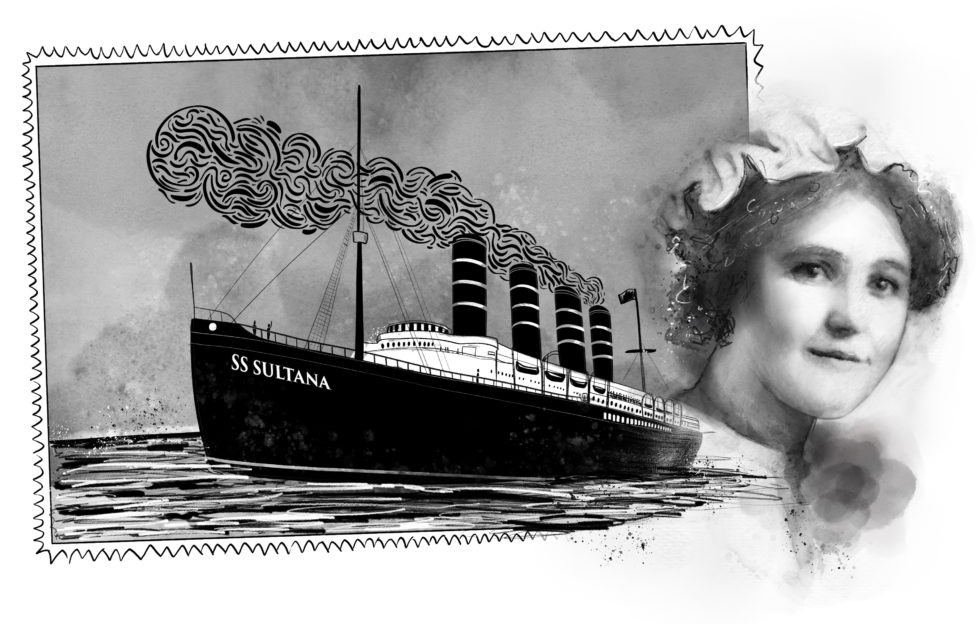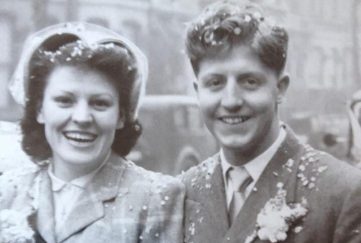“Swept Away: Stories Of A Stewardess” by Francis Myles

This week’s story from our Archives was first published in the pages of “The People’s Friend” in 1893.
It’s part of a long-running series of short stories from the point of view of a stewardess about an ocean liner. We’ll be sharing more of these in the months to come.
We hope you enjoy!
“How are you, Miss Symons? Glad to see your face on board the Sultana.”
“Captain Allardyce!” I exclaimed. “How are you, sir? Are we to have the pleasure of your company on this voyage?”
“Yes, I am going home on leave. Mrs Allardyce is below, I believe. She goes with me, of course.”
I glanced curiously at the gentleman, trying to find out wherein he was changed. For he was changed. Indeed, I should scarcely have recognised in him the gay, happy, handsome young officer who had been a passenger on board the Sultana five short years before.
I decided that it was change of expression more than change of features that had so altered him. His gay, dashing air was gone, and in its place he bore a haggard look as of a man haunted by some secret sorrow or care.
He must have seen my look, for he smiled grimly and said –
“Well, am I much changed?”
Naturally I was very much disconcerted to have my thoughts thus easily read, and I stammered out some words of apology.
“Never mind,” he answered, in a cool, off-and tone. “Wait until you see the lady downstairs and you’ll understand the whole affair.”
In answer to my look of inquiry he said –
“I am very glad to find you here. Indeed, I was just wondering what I was to say or do, but your presence here relieves me of a great burden.”
“Is Mrs Allardyce an invalid?” I asked.
“Yes—no. That is to say, Muss Symons, she is suffering from a disease which is only too prevalent amongst Anglo-Indian ladies.
“Ah, I see you understand the case now. Poor Lydia! Had her baby lived it might all have been so very different.
“But you see it died, and she was left empty-handed, and there have been no successors in the nursery.
“We were stationed at a poky little hill village, where there was no company; and, I suppose, she learned the bad habit out of sheer loneliness and depression.”
Of course I promised Captain Allardyce to do all I could for his wife. Unfortunately I knew by experience the class of passengers to which she belonged, and the trouble they usually entailed.
As I went below I recalled her to my memory. Once more I saw her – a bonnie, happy, young bride, going out with her fond and devoted husband. They had been such a likely couple. And now —
A feeling almost of horror seized me as I saw the bloated, misshapen figure reclining on the sofa-berth. Could that woman be the handsome, slender young girl of five years ago?
“So glad to see you once more, Miss Symons,” she said, languidly, as she lazily turned her face towards me. “We are going home, you see. Are we to have many passengers?”
I could see from her face and tell from her utterance that she was just then pretty bad. However, I answered her civilly, and set about getting her belongings tidied and stowed away.
After a good deal of persuasion, I managed to get her to bed, for I wanted to keep her out of sight just then. Presently I sought Captain Allardyce, and asked him a few questions.
“She has none in her luggage, and I shall do as you advise, and instruct Jackson not to let her have any on board ship.”
“Excuse me having spoken so plainly, sir,” I said, “but better be open with me, and save a scandal on board.
“Now, you see, I know exactly where I am, and what I have to do. Oh, no, it’s no new job for me. I may fair – I have failed before – but I shall do my best to make your voyage a pleasant one.”
We had been several days at sea before Mrs Allardyce ventured on deck. When she did so, it was amusing to see the looks bestowed on her by ladies and gentlemen alike.
She was immensely stout, but yet her figure was not without proportion. The curious thing was her still young-looking face, which accorded so ill with her overgrown body.
As she kept well and spent a large proportion of her time on deck, she gradually regained some of her old good looks. She had had a remarkably fine complexion. Her eyes were good, while her hair was very abundant and of a beautiful dark brown colour.
I was just beginning to congratulate myself on having got her almost half-way home without any trouble, when I noticed a change in her behaviour.
All at once she became very restless and nervous. This was followed by a fit of depression, that warned me of trouble in store.
*
It happened at this time that a passenger at the other end of the ship was seriously ill. Indeed, young Dr Crammond almost despaired of her life for a few days.
The sick woman had two little children – bonnie little lassies with long fair curls and doll-like faces, and the ladies on deck voluntarily promised to look after and amuse the children.
Mrs Allardyce was passionately fond of children; indeed, the want of children of her own was a great trial to her.
“Hasn’t that poor Mrs Smith another child, a young baby?” she asked me one day.
“Yes, ma’am,” I replied. “The baby is only two months old. She had set out for home too soon, and hurt herself, you know.”
“If you care to bring me the baby, and if the mother will allow me too, I shall nurse it for a little.”
I gladly acceded to her request, and set off in search of the baby. Here was something to fill up her time and occupy her thoughts.
“I shall take it back to its mother when it cries,” she said, after she had kissed and admired the baby which I placed in her arms. “Yes, I know her cabin.”
Well, I’ve never exactly found out what happened afterwards. She nursed the baby for a long time, and then, true to her promise, she took it back to the mother.
Now, Mrs Smith’s case required stimulants, and in her cabin was a large bottle of brandy that had been newly uncorked.
The sight of it must have been too much for poor Mrs Allardyce, and ere she left Mrs Smith she had artfully obtained possession of the bottle and concealed it about her dress.
That day the weather changed, and a heavy story broke over the Sultana. Towards afternoon we shipped several heavy seas, and one of them carried away part of our bulwarks.
“For God’s sake, Miss Symons, look after my wife,” said Captain Allardyce, as I met him in the saloon passage.
His face was very white, and I noticed drops of perspiration standing on his brow.
“Your wife!” I exclaimed. “Surely she isn’t –”
I paused, shocked and horrified, and quite astonished.
“She has just been on deck blazing drunk,” the wretched husband said. “A fine exhibition she has made! However, she is below again, and she will require constant watching.”
“Where did she get the drink?” I asked. “Stolen out of Mrs Smith’s cabin, you think! Ah, very likely.
“Well, sir,” I continued, “we shall have our work with her now. Once she has broken out and has nothing to hide, she won’t be easily managed.”
His only answer was a groan. My heart bled for him, while I was not without pity for the wretched woman to whom he was tied.
She was too intoxicated to cause much trouble during the first part of the night. But as the effects of the drink wore off she became conscious and very restless.
Here’s a little bonus — a video of Illustrations Editor Manon creating the fantastic design for this story!
It was still very early, scarcely day-dawn, when she got up and insisted upon going on deck. At first I tried my best to persuade her to be still. But when I found entreaties of no avail I gave in, and assisted her to fling on some warm garments.
“I must have a breath of fresh air,” she said. “I must, I tell you. No, I shan’t be still. I will go on deck.”
“But, Mrs Allardyce,” I pleaded, “it’s dark yet, and there’s a storm raging.”
“So much the better,” she replied, “the wind will freshen me up.”
“But it’s not safe.”
“Not safe? What’s dangerous about it?” she scornfully said.
“Part of the bulwarks have been swept away. I don’t think they’ve got them even patched up yet.”
“Let her go, Miss Symons,” said her husband, whom I had called. He was standing looking at her. I noticed that his face was very white, and that his eyes were full of an angry light.
“I shall go with her. But she is not the kind that any harm befalls. My God! No, she’s the sort that lives and lives until other folks lives are ruined, and their hearts eaten away.”
I felt too keenly for the man to make any reply. The wife took no notice of his remarks. She was in a state of mental confusion, but sober enough to stick to her point.
“Be careful, Lydia,” I heard Captain Allardyce say as she tripped while going upstairs. “How can you be so reckless?”
Her light, scornful laugh was borne to where I stood, and as it reached my ears I pitied her husband afresh. She could be so terribly aggravating.
Half an hour later I went on deck, as I grew anxious to know how the couple upstairs were getting on.
The sight that met my eyes was cold and cheerless, nay, dark and threatening. The waste of waters was unbroken by any sail or vessel. Nothing was to be seen but the wind-torn angry sea with its wild, mighty, leaping waves, that seemed in some places almost to touch the dark, leaden-grey, lowering sky.
Ever and anon a wave, larger than its fellow, would break angrily over the deck of the Sultana and drench everything on deck.
“She’ll be wet to the skin,” I mentally exclaimed in annoyance. “I must try to get her downstairs at once.”
“Ah, there they are,” I said aloud, as I caught sight of Captain Allardyce and his wife standing close to the broken bulwarks. “What a pair of fools! Whatever are they standing there for?”
Even as I thus exclaimed, a great greyish-green wave advanced quickly towards the ship. On it came, the white crest torn into foam by the raging gale.
“Look out,” I shouted, screaming almost as I advanced towards the couple in front of me.
Even as I spoke Captain Allardyce suddenly loosened his hold on his wife’s arm. As he di dso the mountain of green water fell upon the deck, and as it broke it carried all before it.
Instinctively I clutched at a handy rope, and I saw Captain Allardyce do the same.
And his wife!
When the waters swept the deck they washed her over the side where the bulwarks had been smashed. The scream she gave as the waters bore her off her feet seems even yet to ring in my ears.
The next minute she was merely ablack speck tossing on the waters, ever drifting farther and farther from us.
In an instant all was confusion and bustle. The engines were reversed; but owing to the terrible sea no boat could be launched.
Suddently the black speck disappeared, swallowed up by the devouring waters. And all that was mortal of Lydia Allardyce vanished from the eyes of those who stood in helpless agony watching her.
“You’d better come below, Allardyce,” I heard Captain Steele say, as he touched the bereaved husband on the arm.
Until then I had not looked at Captain Allardyce. But as I did so I felt a shiver run through me. The expression on his face baffles description. It was awful to see him.
As the skipper spoke to him he passed his hand over his face as a man awakening from a dream. Without one word, without one outcry or regret, he turned and let himself be taken downstairs. But as he reached the top of the stairs I saw him give one quick, fearful glance at the sea, and then a shiver passed over him.
It was a fearful day that followed. Shocked and saddened by the terrible event that had taken place in the early morning, the most of the ladies grew exceedingly nervous as the storm went on increasing in fury.
Little time was left to me in which to indulge my own feelings. For, truth to tell, my own nerves had received a severe shock. Jackson told me that Captain Allardyce had gone to bed, and I was thankful to hear it.
“Is anything seriously wrong?”
It was to young Dr Crammond I addressed my question. We had met at the door of Captain Allardyce’s cabin, and the doctor’s grave face struck me with sudden apprehension.
*
A couple of days had elapsed since the melancholy affair on deck, and we had sailed into smoother waters. Although I had not seen Captain Allardyce during that time, I had not had the slightest suspicion of anything being wrong with him.
It was natural, considering the circumstances, that he should like to be alone.
Dr Crammond looked at me ponderingly for a second or two. Then he pulled me gently into the steward’s pantry and closed the door.
“He’s in for brain fever,” the doctor said, jerking his head in the direction of Captain Allardyce’s cabin. “And, Miss Symons, he’s to be pretty bad.”
“Oh dear! How dreadful!” I cried. “As if we did not have enough to do as it is.”
My selfishness grated on my ears as soon as the words left my lips. Bitter thoughts crossed my mind, and I said –
“Poor fellow! The shock must have been too much for him.”
“I fear he has had a slight sun-stroke some time ago,” the doctor said. And then he proceeded to arrange with me as to nursing his patient.
Without entering into details, I may first say that the next ten days that followed seemed to me, when I look back, to be a hideous nightmare. For as I sat by the sick man’s bedside and listened to his incoherent ravings, a terrible suspicion awoke in my mind.
And, alas, ere long I knew those suspicions were well founded.
It was exactly fourteen days from the date of Mrs Allardyce’s death when her husband’s body was committed to the deep. After consultation, Captain Steele decided not to take the body home.
After the service was over I went below to tidy up the cabin a bit.
“Isn’t it terrible,” I said to the doctor, who had entered after me, “ to think that both of them are gone? That neither are to reach England?”
“Poor Allardyce,” Dr Crammond said. “I don’t think you should mourn his death, Miss Symons. What would his life have been had he been spared?”
Our eyes met. There was no need for further words between us. He too had guessed the dead man’s secret.
Driven desperate by his wife’s unfortunate habit, bowed down by shame at her condition, he had yielded to a sudden temptation, and had practically taken her life when he released her arm as he saw the wave approaching the ship.
As I thought on his awful temptation, and on the life he had led ere he had been driven to such an extremity, I felt heart-sick and utterly bewildered. It was too hard for finite wisdom to understand.
God only knew the whole circumstances. Let Him judge the dead, both man and wife.
The doctor and I, of course, held our tongues, and none of the passengers knew of the awful tragedy that had taken place on board.
It was better they should think Mrs Allardyce’s death the result of an accident, and wonder over the sad fate that befell her husband and herself.
Click here to read more of our fantastic Fiction content.
Click here to delve into our dramatic Daily Serial.





